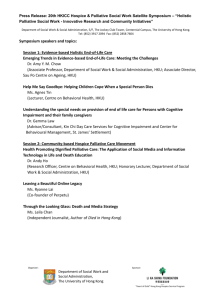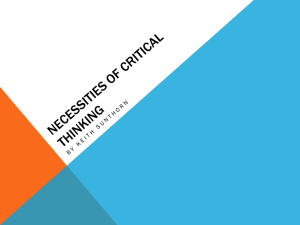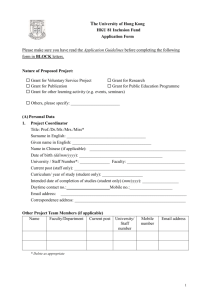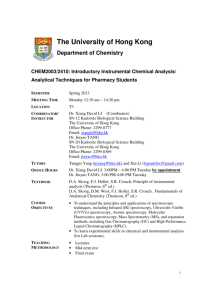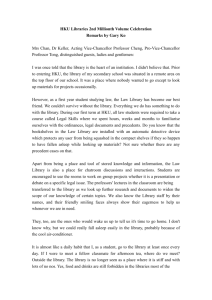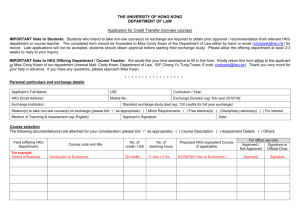Elements of Logic - Philosophy HKU
advertisement
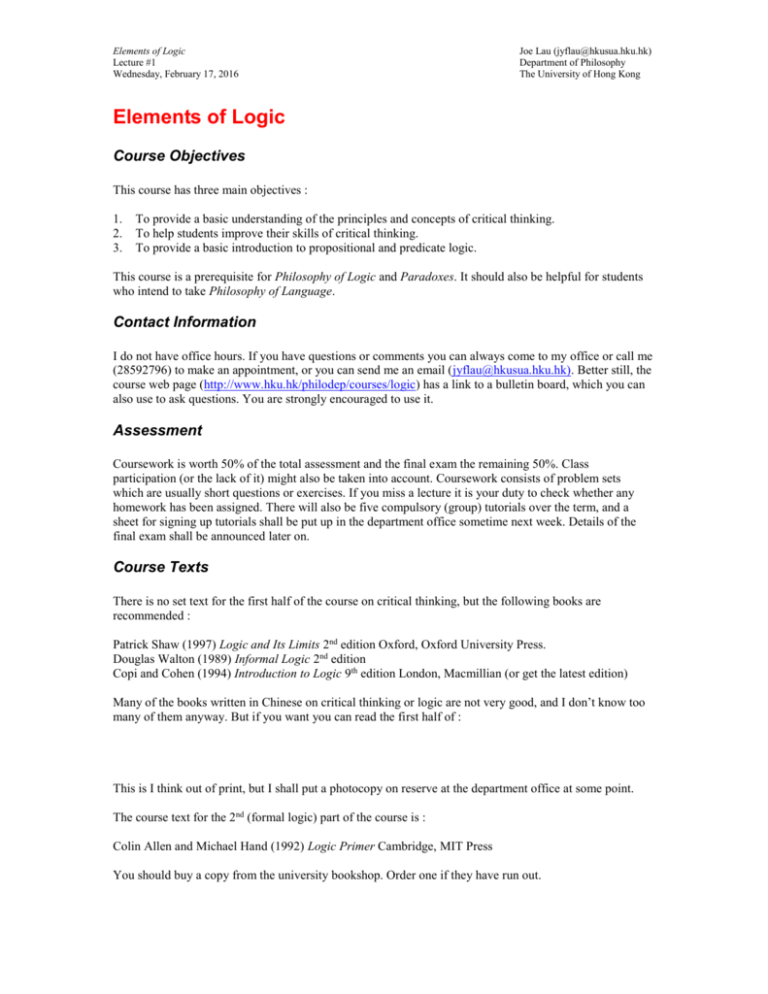
Elements of Logic Lecture #1 Wednesday, February 17, 2016 Joe Lau (jyflau@hkusua.hku.hk) Department of Philosophy The University of Hong Kong Elements of Logic Course Objectives This course has three main objectives : 1. 2. 3. To provide a basic understanding of the principles and concepts of critical thinking. To help students improve their skills of critical thinking. To provide a basic introduction to propositional and predicate logic. This course is a prerequisite for Philosophy of Logic and Paradoxes. It should also be helpful for students who intend to take Philosophy of Language. Contact Information I do not have office hours. If you have questions or comments you can always come to my office or call me (28592796) to make an appointment, or you can send me an email (jyflau@hkusua.hku.hk). Better still, the course web page (http://www.hku.hk/philodep/courses/logic) has a link to a bulletin board, which you can also use to ask questions. You are strongly encouraged to use it. Assessment Coursework is worth 50% of the total assessment and the final exam the remaining 50%. Class participation (or the lack of it) might also be taken into account. Coursework consists of problem sets which are usually short questions or exercises. If you miss a lecture it is your duty to check whether any homework has been assigned. There will also be five compulsory (group) tutorials over the term, and a sheet for signing up tutorials shall be put up in the department office sometime next week. Details of the final exam shall be announced later on. Course Texts There is no set text for the first half of the course on critical thinking, but the following books are recommended : Patrick Shaw (1997) Logic and Its Limits 2nd edition Oxford, Oxford University Press. Douglas Walton (1989) Informal Logic 2nd edition Copi and Cohen (1994) Introduction to Logic 9th edition London, Macmillian (or get the latest edition) Many of the books written in Chinese on critical thinking or logic are not very good, and I don’t know too many of them anyway. But if you want you can read the first half of : This is I think out of print, but I shall put a photocopy on reserve at the department office at some point. The course text for the 2nd (formal logic) part of the course is : Colin Allen and Michael Hand (1992) Logic Primer Cambridge, MIT Press You should buy a copy from the university bookshop. Order one if they have run out. Elements of Logic Lecture #1 Wednesday, February 17, 2016 Joe Lau (jyflau@hkusua.hku.hk) Department of Philosophy The University of Hong Kong Course Schedule There are a total of twenty lectures for this course. The provisional schedule for the lectures is as follows. The numbering within the square brackets refer to the relevant sections in Allen and Hand’s book. 1. General Introduction Critical Thinking 2. 3. 4. 5. 6. 7. 8. 9. Arguments Questions and Statements Concepts All and Some, Part and Whole Tricks and Traps Causation Probability Fallacies Propositional Logic 10. 11. 12. 13. 14. Formalization Proof I Proof II Truth-tables I Truth-tables II [1.1-1.3] [1.4-1.6] [1.4-1.6] [2.1-2.2] [2.3-2.5] Predicate Logic 15. 16. 17. 18. 19. 20. Quantifiers I Quantifiers II Models I Models II Relations and Identity Glimpses Beyond [3.1-3.2] [3.3-3.4] [4.1-4.2] [4.3-4.4] Elements of Logic Lecture #1 Wednesday, February 17, 2016 Joe Lau (jyflau@hkusua.hku.hk) Department of Philosophy The University of Hong Kong General Introduction Thinking Well 1. Whether one is successful in life depends on a lot of factors, such as luck, background, motivation, and the ability to think well. The main aim of this course is to help you to become a better thinker. 2. Being able to think well involves being able to use our reason to solve problems and to achieve our goals in an appropriate and efficient manner. 3. This requires the ability to think critically and creatively. Creativity enables us to formulate new and useful ideas, and critical thinking can help us evaluate the validity and usefulness of our ideas. 4. It is not difficult to identify some of the principles of critical thinking, but this is much harder to do for creative thinking. 5. But critical thinking can be important for creativity because it can help us identify the more probable sources of new ideas and to throw out bad ideas more efficiently. 6. Not everyone is equally skillful in thinking critically. But apart from natural talent, training is also an important factor. Muddled thinking is unfortunately very common. 7. To be skillful at a certain activity X typically involves two kinds of knowledge : (theoretical) knowledge of what it is to be good at X, and (practical know-how of) being able to apply such knowledge in doing X. 8. Taking a short course or reading books in critical thinking can provide some of the theoretical knowledge, but improving one’s skills requires practice and the internalization of such knowledge into everyday thinking. Critical Thinking 1. The main part of critical thinking involves the of analysis of reasoning, so that we can (a) decide whether it is good or bad reasoning, and (b) explain what is right or wrong with the reasoning. 2. So it is a special kind of meta-thinking, thinking about thinking. Reflection allows us to improve our thinking. 3. The capacity for critical thinking is one important respect in which human beings are different from other animals, and without which science (and philosophy and much else) would not be possible. 4. Critical thinking is not just being clear and concise. 5. Critical thinking is not the same as being critical of others or being argumentative. 6. Here is one possible division of the area of critical thinking : analysis of arguments and reasoning, analysis of statements and questions, analysis of concepts, analysis of fallacies and bias. The last is a systematic application of the principles from the first three areas.
